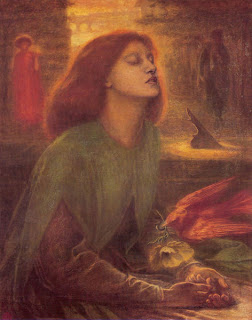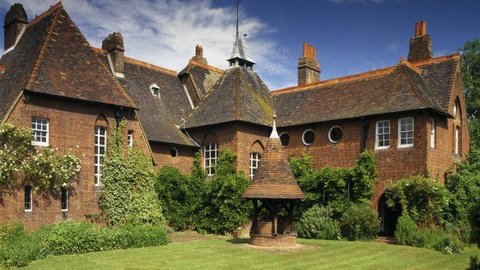|
On impulse, rather than to take the tube back to Chelsea, I decide to go to Highgate where Lizzie has been buried (presumably) since Rossetti had her disinterred on an October night in 1869.
At the foot of the High Street, the bus stops, and I get off. Midway up the hill, I feel the sting of a blister forming on my right heel. My shoes, ballet flats, are not meant for real walking.
Waterlow Park skirts the gated grounds of the cemetery. Shoes in hand, I walk across grass seeking the shadow of a gargantuan chestnut tree. I sit down in the shade, nearly blinded after walking in brilliant sun. When my eyes adjust, I examine the offending blister. Nothing to do but try to ignore it.
Across the road from the gatehouse, I drop the shoes in the grass and ease my feet into them.
I walk through the archway. To the right is a former chapel, now a shop. There is no one about. I'm happy to wait in the coolness emanating from stone. Assuming someone will momentarily appear, I leaf through a book of Highgate photographs. In the center, there is a two page spread of Egyptian Avenue, a grand arch flanked by columns embellished with lotus buds. Victorians were Egyptophiles. To the nth degree.
When a rod-straight woman with cropped hair the colour of wire wool appears, I set the book back on the table, introduce myself and ask if I may see the Rossetti grave.
She does not introduce herself. Instead, she says, "It is our policy, Miss MacPherson, to allow access to the West Cemetery only with a guide, unless, of course, one is a family member."
Her hauteur only makes me more determined to see the grave: "That should not be a problem, since my mother is a great grandniece of Elizabeth Siddal Rossetti."
She looks at me with distain.
I do not look away.
"There are so many redheads about, you understand."
Unblinking, I hold her gaze.
After a few moments, she concedes. "But, I can't deny that there is a resemblance."
If I hang about any longer, she may decide to demand written proof, some sort of notarized genealogical record. So I try to spur her on. "Well, then, would you be so kind as to point out the way."
"I'll fetch you a map," she says.
I feel slightly ashamed of my little performance. But I could see no other way around the disagreeable docent.
Outside, she hooks the bows of steel framed glasses behind her ears and jabs at the map with the tusk-coloured nail. "The Rossetti family is close. Only a short walk from here."
I follow the path, map in hand. Happy to have made a clean getaway.
Within minutes, I've left Swains Lane behind. I'd heard that Highgate was overgrown, but I was not prepared for the wildness. Wrens flit in mottled light, one tiny brown bird perches atop a broken column. Headstones on either side of it have been literally prised from their foundations by python-thick vines. In spots where sunlight penetrates, swirls of white flowers bloom. The cemetery seems to have evolved from a private necropolis to a wildlife sanctuary, fantastic mausoleums, marble angels and obelisks existing solely to support flora and fauna.
I find the Rossetti family plot in an intimate bower surrounded by clutches of pink cyclamen nodding on limp stems. The headstone is crowned with a four-petaled blossom. A small horizontal slab lying at the foot of the headstone acts as an addendum:
Also to the memory of Elizabeth Eleanor, wife of their elder son Dante Gabriel Rossetti.
Also.
Elizabeth Eleanor lay with the Rossettis. Shuffled together like playing cards. I squat and trace her name. An eternal cold seems to seep from the stone through my fingertips into my body.
The once hallowed ground feels abandoned. I stand and look up through the trees at a piece of blue puzzle sky. And on the off chance, that she happens to be hovering in the aether, I say, "If you're up there, Lizzie..." But the crackle of leaves being trod on stops me midsentence, making the hair stand at the back of my neck.
I turn around slowly. Beyond the path, a pair of ravens plod about a stunted holly tree, stopping to flip over decomposing litter with their beaks. They work as delicately as lapidarists separating stones of different shapes and sizes.
"Okay, Fi," I say aloud, "just get on with it."
The birds eye me, an uninvited guest, and continue their genteel scavenging.
|


